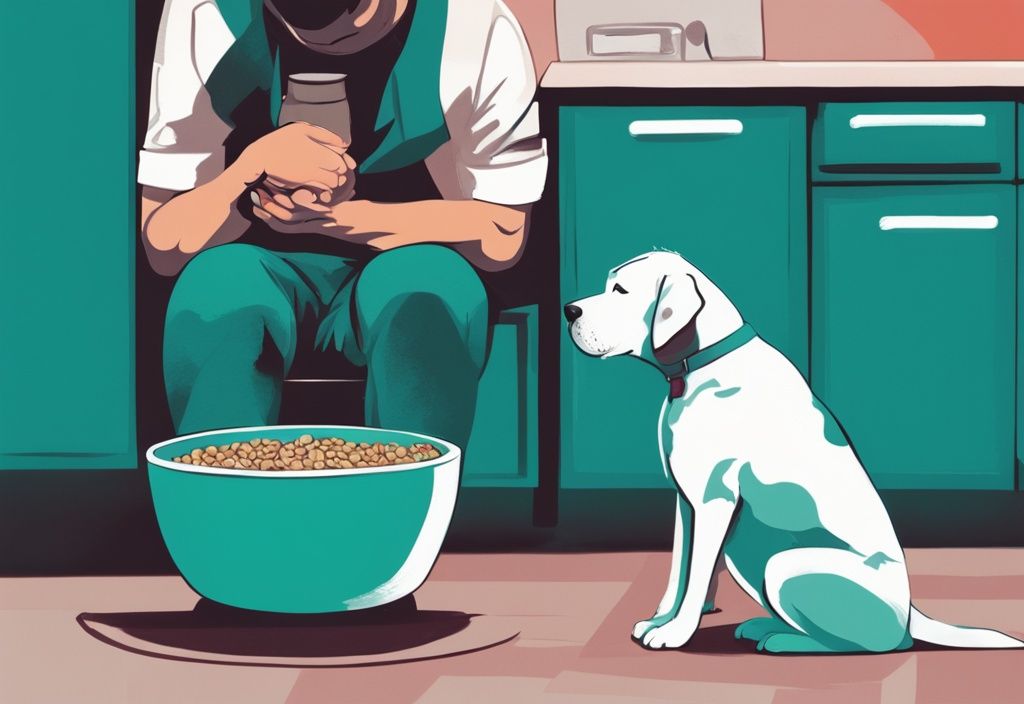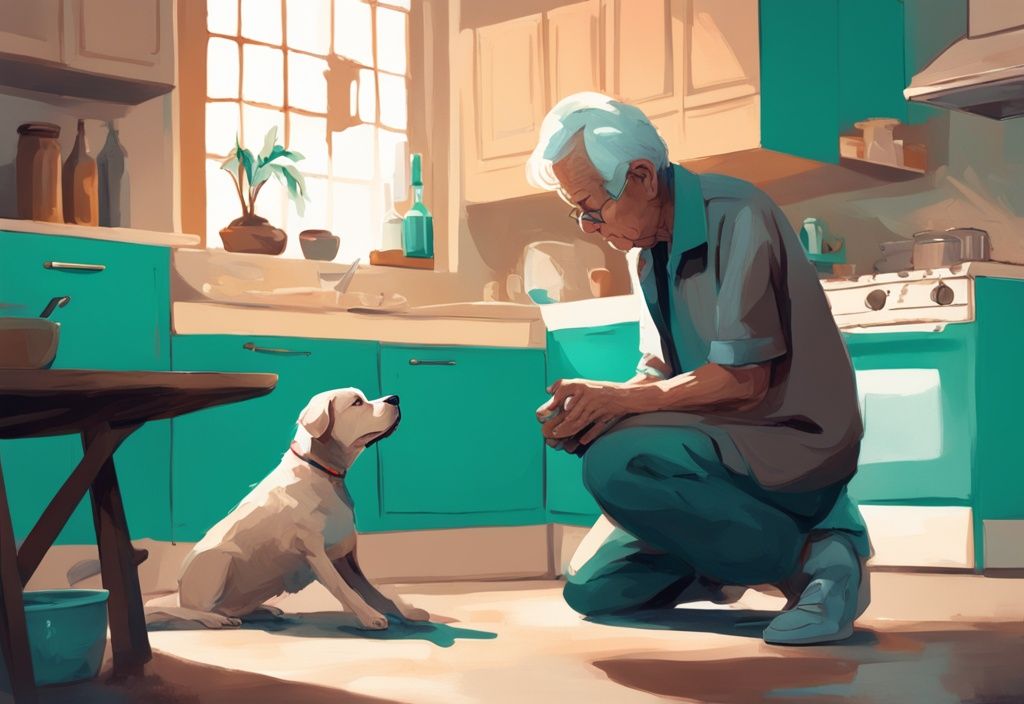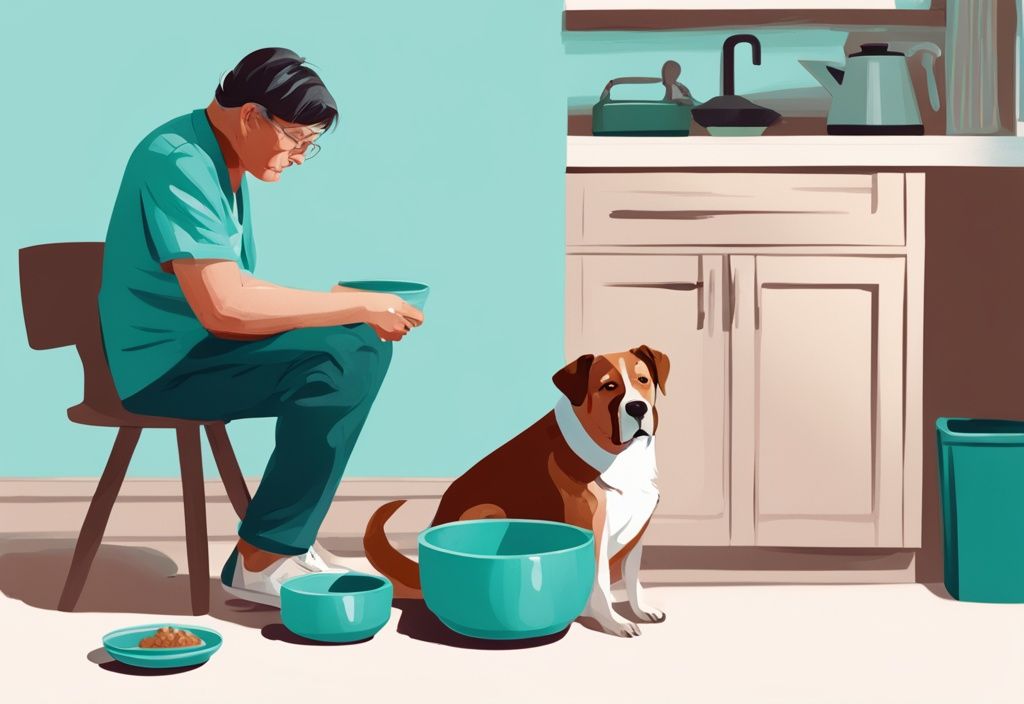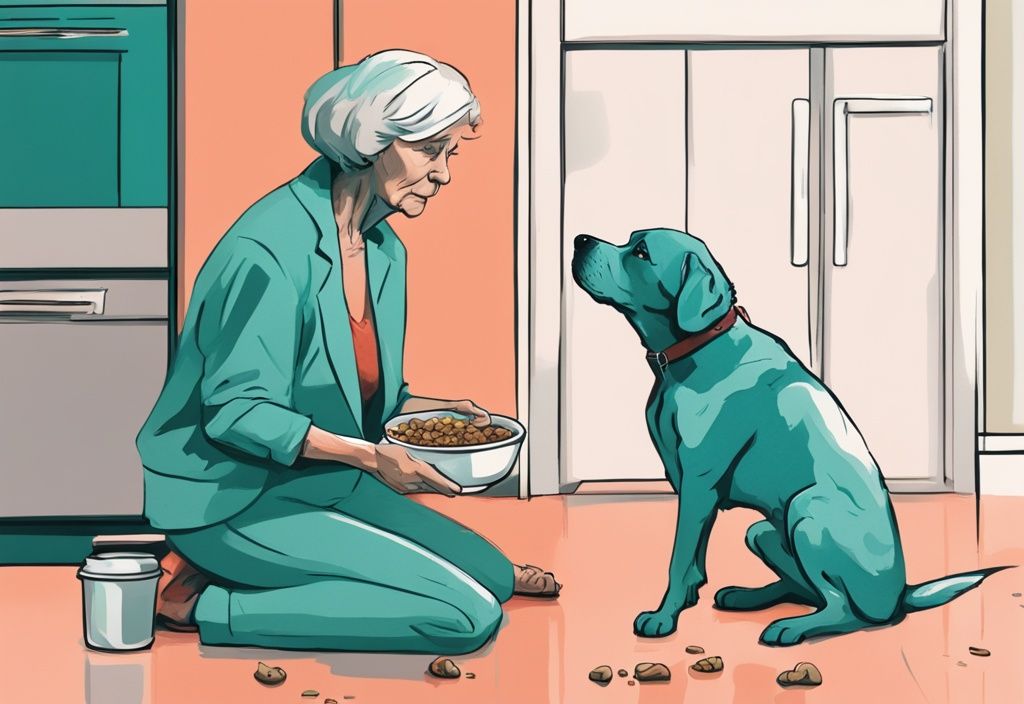Hey, fellow pet parents! Has your senior dog been snubbing their once adored meals? As our furry friends age, their appetites can become as unpredictable as an unsolicited doorbell ring on a Saturday morning. You’re left puzzled, wondering, “Why is my senior dog not eating?” You clicked on this because, well, you need some insights—possibly a solution—and I’ve been there too, trust me.
In this comprehensive guide, we’re going to map out the possible reasons behind your dog’s sudden culinary indifference. We’ll also offer some proven strategies to make meal times tempting again. Just like solving a doggy mystery, right? So, stick around; let’s make those gray muzzles eager to eat once more.
Overview: The Reasons Behind Your Senior Dog’s Loss of Appetite
A senior dog’s refusal to eat can be truly worrisome for pet owners who cherish their furry companions. But understanding why your senior dog is not eating is key to ensuring their well-being and addressing the problem effectively.
When an older dog loses their appetite, they’re often signaling an underlying health concern. This symptom can uncover a variety of medical issues. For example, physical discomforts like arthritis or dental problems can be culprits, and more serious conditions like kidney disease, diabetes, or gastrointestinal troubles could be at play.
Environmental and emotional factors shouldn’t be overlooked either. Changes in surroundings, disruptions in routine, or even stress and anxiety can make a senior dog hesitant to eat. As dogs age, they might experience sensory changes—like a diminished sense of taste or smell—that make their usual food less enticing. For more insights on how to better care for senior pets, visit the American Veterinary Medical Association’s resources on senior pets.
By grasping these diverse reasons for appetite loss, you can better support your senior dog. It’s important to know when to seek veterinary help and how to tweak feeding strategies to keep their diet healthy. Imagine easing back into a favorite routine or offering meals in a quiet, comforting space—simple changes can make a world of difference to your beloved pet.
Understanding Why Your Senior Dog May Not Be Eating
Welcoming a senior dog into your life comes with its unique set of joys and challenges. One day, you may find yourself puzzled, asking, “Why is my senior dog not eating?” Let’s explore some common reasons so you can get back to enjoying those delightful moments with your furry friend.
Common Physical Problems Resulting in Appetite Loss
Discomfort Due to Arthritis, Dental Issues, and More
Imagine trying to enjoy your favorite meal with a toothache or sore joints. Senior dogs can experience similar discomfort. Arthritis can make standing or reaching their food bowls painful challenges. Dental issues, including broken teeth and gum disease, can turn eating into a dreaded activity. Even back and neck pain can interfere with their eating habits. It’s no wonder they might steer clear of their meals!
Gastrointestinal Issues: Pancreatitis and Obstructions
Another culprit could be gastrointestinal issues.
Conditions like pancreatitis, which causes abdominal pain, can dampen their enthusiasm for food. And let’s not forget the discomfort from gastrointestinal obstructions. Whether it’s a pesky tumor or an unnoticed foreign object, these blockages can make eating an unpleasant experience. Often accompanied by symptoms like vomiting and diarrhea, these issues can put your dog’s appetite on hold.

Systemic Illnesses: Heart, Kidney, Liver Diseases, and Diabetes
Systemic illnesses can also play a significant role. For instance, kidney disease can lead to toxin build-up, causing nausea. Liver disease disrupts the detox process, while diabetes creates blood sugar fluctuations that can mess with hunger signals. Even heart and lung diseases can make breathing tough, leading to food becoming a secondary concern. All these factors together can significantly impact why your senior dog isn’t eating.
Impact of Emotional & Environmental Factors on Eating Habits
Stress, Anxiety, and Changes in Routine
Senior dogs, just like Max, can be sensitive to emotional changes. Moving to a new home, adding new family members or pets, or even changing their feeding times can cause stress. Anxiety can lead them to associate mealtime with negative feelings, making them reluctant to eat. Stability and routine are their best friends in maintaining a healthy appetite.
How Sensory Changes Like Loss of Smell/Taste Affect Diet
As dogs age, sensory changes are common. If your senior dog loses their sense of smell or taste, food might seem less appealing. This sensory decline can also make them fail to recognize foods they once loved. Knowing this can help you adjust their diet to stimulate their senses and encourage better eating habits.
Identifying When to Seek Veterinary Help
Understanding when to seek veterinary help for a senior dog not eating is crucial for timely intervention and effective treatment. If your senior dog hasn’t eaten for more than 24 hours, it’s time to consult a veterinarian immediately. Trust me, I’ve been there with Max, my loyal Border Collie. Loss of appetite in older dogs can signal serious health issues that require prompt attention. Other symptoms that necessitate veterinary care include:
- Vomiting
- Diarrhea
- Excessive drinking and urination
- Lethargy
- Depression
- Significant weight loss
These signs can indicate underlying medical conditions that need further investigation and treatment. For pet enthusiasts, learning about various animal breeds, like what is the most rare cat, can provide insights into pet care and health. Picture this: Max once stopped eating and started showing lethargy and significant weight loss. After a trip to the vet, we discovered he had early-stage kidney disease. Chronic vomiting or diarrhea can even lead to dehydration, making the issue of appetite loss even worse and potentially leading to more severe health problems.
Early detection and diagnosis of underlying issues lead to better outcomes. By consulting a vet promptly when you notice these symptoms, you ensure that any serious health problems are caught early, improving your dog’s chances for a quick recovery. The vet can perform comprehensive diagnostic tests to uncover the root cause of the appetite loss, such as physical examinations, blood tests, X-rays, and ultrasounds.
In summary, if you’re wondering, “Why is my senior dog not eating?” it’s essential to monitor for additional concerning symptoms and seek veterinary advice without delay. This proactive approach ensures your furry friend’s health and well-being are top priority, giving you more joyful moments together, just like the ones I cherish with Max and Whiskers.

Diagnostic Procedures to Understand Your Dog’s Appetite Loss
Sometimes figuring out why your senior dog is not eating can feel like solving a mystery. Good thing we’ve got some trusty tools to help us out!
What to Expect: Physical Examinations, Blood Tests, and More
Understanding why your senior dog is not eating often begins with a thorough physical examination. The veterinarian will check your dog’s entire body for abnormalities, signs of pain, or discomfort that could be causing the loss of appetite. This detailed examination is crucial to identify any obvious physical issues, such as dental problems, arthritis, or other conditions that might make eating painful or difficult for your pet.
Blood tests are the next step in diagnosing why your senior dog isn’t eating. These tests provide valuable insights into the functioning of your dog’s internal organs. For instance, bloodwork can detect kidney, liver, or pancreatic diseases, all of which can lead to appetite loss. By analyzing the blood chemistry and complete blood count (CBC), veterinarians can pinpoint potential problems that might not be visible during the physical examination.
In addition to blood tests, veterinarians may recommend further diagnostic procedures such as X-rays and ultrasounds. X-rays can reveal internal blockages, broken bones, or tumors that might be causing your dog’s discomfort and reluctance to eat.
Ultrasounds offer a more detailed view of the internal organs, helping to identify issues like gastrointestinal obstructions, tumors, or other systemic illnesses. A urinalysis may also be conducted to assess kidney health and detect infections or other urinary tract issues that could impact appetite.
Each diagnostic procedure is a step towards understanding the complex reasons behind your senior dog’s loss of appetite. Combining physical examinations, blood tests, and imaging techniques gives a comprehensive picture of your dog’s health, allowing for targeted and effective treatment plans.
By addressing the underlying causes, you’ll help your senior dog regain their appetite and overall well-being.
Managing Loss of Appetite: Treatments and Adjustments
Addressing Pain: Treatment Options and Pain Management
A senior dog’s reluctance to eat can often be traced back to pain or discomfort. Effective pain management becomes a critical component in restoring their appetite. Pain from conditions like arthritis or dental issues can significantly impact your dog’s desire to eat.
Medications specifically designed for arthritis can alleviate joint pain, making it easier for your dog to move and access their food. Regular dental cleanings and addressing oral pain, such as broken teeth or gum disease, can further encourage better eating habits.
By using veterinary-approved analgesics or anti-inflammatory medications, you can help manage your dog’s pain levels effectively. The key is ensuring your dog is comfortable and pain-free. A life without pain positively influences their overall well-being and can significantly improve their appetite. To further enhance your German Shepherd’s health, consider researching the best dog food options for German Shepherds. If you’re wondering, “why is my senior dog not eating,” assessing and addressing pain is a crucial step.
How to Adapt Their Meals for Enhanced Palatability
Enhancing the palatability of your senior dog’s meals can be a strategy to stimulate their appetite. One method is offering warm food, which can make the meal more enticing due to the enhanced aroma and flavor. Mixing dry food with warm water or broth not only improves the taste but also makes chewing easier for dogs with dental issues.
Another approach involves switching to more palatable canned food or even homemade meals that are easier to digest. It’s essential to consider the texture and flavors your senior dog prefers; adding certain ingredients or switching food brands can make a significant difference.
Offering smaller, more frequent meals throughout the day might also help. This method can prevent your dog from feeling overwhelmed by large portions and maintain steady energy levels. Introducing variety in flavors and textures can turn mealtime into a more appealing and enjoyable experience, thereby addressing concerns about why your senior dog is not eating.

Innovative Tactics to Motivate Your Senior Dog to Eat
Sometimes, dealing with a senior dog can be like trying to convince a toddler to eat broccoli. There are many tactics you can employ to reignite their appetite. Let’s explore how smaller, frequent meals and the power of hand-feeding can make meal times more enjoyable for your beloved canine.
Benefits of Offering Smaller, Frequent Meals
Offering your senior dog smaller, frequent meals can work wonders in addressing those pesky eating issues. For dogs who feel full too quickly or experience gastric discomfort, tiny meals spread throughout the day can ease the digestive burden. It’s like serving a five-course meal one bite at a time—digestible and delightful. Regular nourishment helps maintain energy levels evenly, preventing those post-big-meal slumps. Plus, you get to play nutritional detective, making it easier to manage their weight and monitor their eating habits.
Another delightful perk of smaller meals is creating a predictable eating routine for your senior dog. Consistency is comforting for our fur babies, who often thrive on structure. Imagine knowing exactly when your favorite snacks are coming—pure bliss, right? For your dog, this predictability can reduce anxiety and enhance overall mental well-being. Tailoring meal frequency to fit your dog’s unique needs creates a nurturing environment that encourages regular, happy eating.
The Power of Hand-Feeding and Social Interaction
Hand-feeding your senior dog is a warm and engaging tactic to boost their appetite. Directly interacting with your pooch has emotional perks, strengthening the bond between you two. Picture this: as you hand-feed your dog, each piece of kibble becomes a token of love, transforming meal times into a cozy, affectionate ritual. It’s a bit like turning dinner into a date night—special and anticipated.
Adding a dash of social interaction can also spice up meal times. Eating alongside other pets or in your presence can create a sense of camaraderie and gentle competition. If you’re looking to enhance your pet’s overall routine, you might want to learn some tips on how to make a dog poop quickly. Watching friends munch away can pique your senior dog’s curiosity, encouraging them to join the feast. Social eating isn’t just about filling bellies; it’s a mentally stimulating activity that can positively impact your dog’s health.
By merging hand-feeding and social interactions, you craft a heartwarming and supportive dining environment that addresses the nagging question, “why is my senior dog not eating?” These methods foster security and comfort, making meal times an event to look forward to. It’s more than just encouraging regular eating; it’s creating joyful moments that promote a healthier, consistent appetite for your furry friend.
Wrapping It Up: Ensuring Your Senior Dog’s Adequate Nutrition
Ensuring that your senior dog maintains a balanced diet is critical for their health and longevity. A balanced diet tailored to meet the nutritional needs of senior dogs can help manage weight, support immune function, and enhance overall quality of life. This involves providing high-quality protein sources, essential fatty acids, vitamins, and minerals while being mindful of calorie intake to prevent obesity.
Trusting your intuition and seeking veterinary advice promptly can result in early detection of underlying issues. If you notice significant changes in your dog’s eating habits, such as refusal to eat, drastic weight loss, or other symptoms like lethargy and vomiting, trust your instincts. Early veterinary consultation can lead to timely diagnosis and effective treatment plans for conditions such as dental disease, arthritis, or gastrointestinal issues.
Monitoring and adjusting feeding routines, ensuring comfort, and providing emotional support can significantly impact your senior dog’s eating habits and quality of life. Regular feeding schedules that align with your dog’s preferences and health requirements can promote better eating habits. Ensuring a comfortable dining area, free from stress and disruption, can make meal times more inviting. Additionally, offering emotional support through gentle encouragement and praising your dog can create a positive association with eating.
By understanding why is my senior dog not eating and addressing the root causes, you can ensure your pet receives the nourishment they need for a healthy, happy senior life.
FAQs for Concerned Pet Owners
What to Do if My Senior Dog Hasn’t Eaten in Over 24 Hours?
Seek immediate veterinary attention. Loss of appetite for more than 24 hours can indicate serious health issues in senior dogs. Monitor for other symptoms like lethargy, vomiting, diarrhea, and rapid weight loss.
Can Stress Result in a Senior Dog Refusing Food?
Yes, stress and anxiety are common causes of appetite loss in senior dogs. Changes in environment, routine, or household dynamics can trigger stress-induced loss of appetite.
Are Some Foods Specifically Designed to Boost a Senior Dog’s Appetite?
Yes, specialized diets and high-palate foods are designed for senior dogs to encourage eating. Prescription diets may be recommended by veterinarians to address specific health issues and improve appetite.
What Tests Can Be Done to Diagnose the Cause of Appetite Loss?
Common diagnostic tools include physical examinations, blood tests, urinalysis, X-rays, and ultrasounds. Specific tests depend on initial findings and symptoms presented by the dog.
Is Eating Less a Normal Part of Aging for Dogs?
Reduced energy needs can naturally lead to decreased food intake in senior dogs. However, significant or sudden changes in appetite should be evaluated by a veterinarian to rule out health issues.
